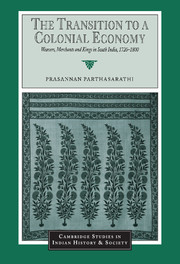Book contents
- Frontmatter
- Contents
- List of tables
- Acknowledgments
- Note on Indian words and place names
- Note on money
- List of abbreviations
- Introduction
- 1 Weavers and merchants 1720–1760
- 2 Agriculture and cotton textiles
- 3 Weaver distress 1765–1800
- 4 Weaver protest
- 5 Laborers, kings and colonialism
- Glossary
- Bibliography
- Index
- Titles in the series
5 - Laborers, kings and colonialism
Published online by Cambridge University Press: 05 July 2009
- Frontmatter
- Contents
- List of tables
- Acknowledgments
- Note on Indian words and place names
- Note on money
- List of abbreviations
- Introduction
- 1 Weavers and merchants 1720–1760
- 2 Agriculture and cotton textiles
- 3 Weaver distress 1765–1800
- 4 Weaver protest
- 5 Laborers, kings and colonialism
- Glossary
- Bibliography
- Index
- Titles in the series
Summary
The Company defeated fierce weaver resistance, reorganized cloth production, and drove down the earnings of weavers. Kings in South India, by contrast, did not exercise such disciplinary authority. They did not enforce weaver contracts with merchants. Nor did they assist merchants in collecting debts or limit migration by weavers. Rather, kings were more likely to do the opposite, checking merchant power and protecting weavers from the claims of merchants. Similarly, in agriculture kings in South India were not in a position to limit the mobility of agrarian producers, which created a powerful incentive for agricultural improvement. What accounts for the profound diffierences between South Indian kings and the Company state, both in the power they wielded and in the ways state power was deployed?
The answer to this question lies in the very diffierent conceptions of authority that guided the Company and South Indian kings. To put it simply, the coercion and disciplinary authority exercised by the Company were not seen as a legitimate use of the powers of kingship in South India. Therefore, these powers were not available to South Indian kings. Conceptions of proper rule, which checked South Indian political authority, did not limit the Company as it operated, in part, according to a vision of the state as it had developed in England. For several centuries the English state had been intervening actively in the lives of laborers and in the operation of the labor “market.”
- Type
- Chapter
- Information
- The Transition to a Colonial EconomyWeavers, Merchants and Kings in South India, 1720–1800, pp. 121 - 148Publisher: Cambridge University PressPrint publication year: 2001



